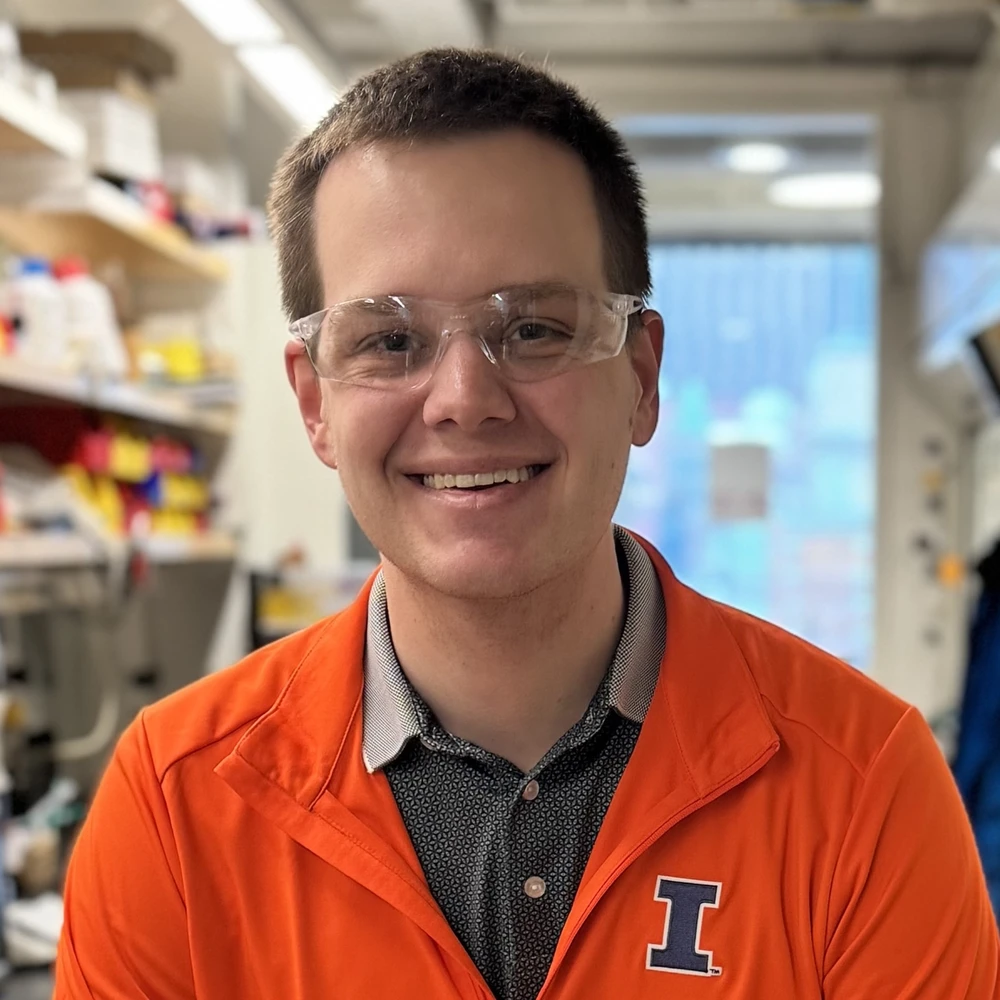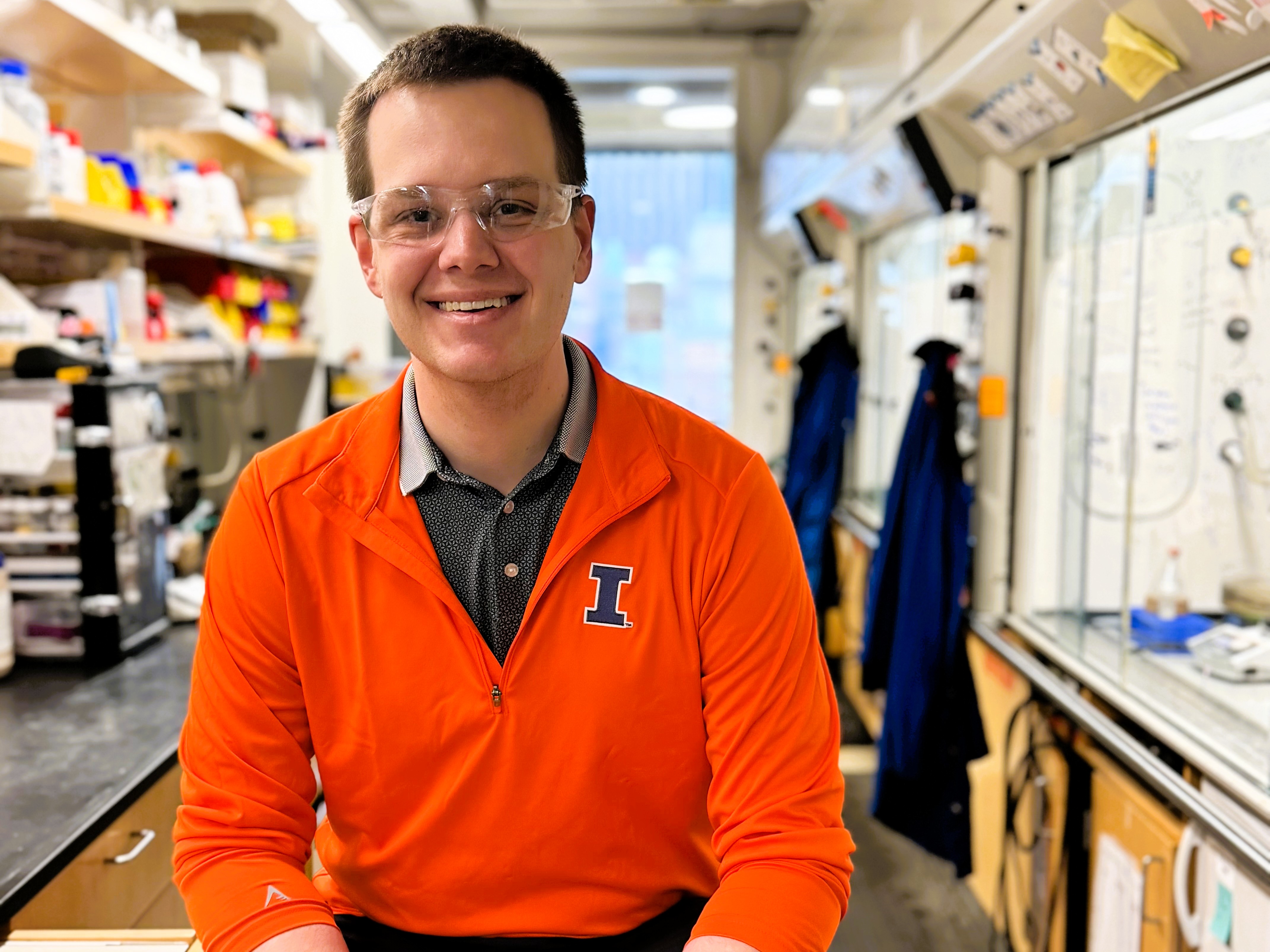

For Michael Strauss, this fall marks an exciting time in his career as a new assistant professor of chemistry at Illinois for many reasons, but especially because he is eager to launch his research group and blend creativity with organic and materials chemistry in order to challenge traditional approaches to materials synthesis, functionalization, and degradation.
In a world where more than 500 million metric tons of plastic is generated annually, Strauss said he wants to lead his group in thinking “outside the box” about how these materials are generated and find ways to use them once their life as a conventional plastic has ended.
“I am beyond excited to be starting this phase of my career,” said Strauss, who joined the Illinois chemistry faculty on July 16. “I feel like this is the time when I can be as creative as I want and identify any problem in the world I want to solve. Asking the hardest questions and thinking of ways my research team and I can solve them is incredibly stimulating.”
Strauss earned his Ph.D. with Professor William Dichtel at Northwestern University, where he was a National Science Foundation Graduate Research Program fellow studying the supramolecular polymerization of macrocycles into high-aspect ratio nanotubes, which involved both organic and materials science.
“This certainly shaped my desire for my own research program to be an interdisciplinary blend of both organic and materials chemistry,” Strauss said.
But in preparation for pursuing this blend of chemistry, Strauss said he realized he needed more formal training in organic chemistry, specifically in the development of new synthetic methods. So, he joined the laboratory of Professor Stephen Buchwald at MIT where he worked as a National Institutes of Health Ruth L. Kirschstein Postdoctoral Fellow, developing new catalysts for Cu-catalyzed carbon–heteroatom bond-forming reactions.
At Illinois, Strauss hopes to use his expertise in reaction design and development to devise new synthetic approaches for polymer synthesis, functionalization, and degradation.
“I believe that we will be uniquely positioned to challenge conventional ideologies in polymer design by enabling new, target-driven syntheses of materials with tunable emergent properties,” Strauss said.
His research program in the Strauss Research Group will involve a lot of fundamental research but will connect the fundamental science with problems of practical importance, like finding solutions for repurposing plastic materials.
“This level of intellectual freedom is one of the reasons I wanted to pursue a career in academia, and it is an amazing feeling to know that I have finally reached this point,” Strauss said.
A native of Wisconsin who grew up in Appleton, Strauss fell in love with chemistry in the classroom of chemistry teacher Kara Pezzi. Uncertain about career paths in the hard sciences, he attended Winona State University to pursue a B.S. in biochemistry with the intention of going to medical school. Those plans changed his sophomore year when he took organic chemistry with professors Thomas Nalli and Robert Kopitzke.
“This was one of the first times I was deeply challenged in the classroom and that challenge made me fall in love with organic chemistry and led me to change my career goals to pursue a Ph.D. in chemistry,” said Strauss, who graduated Summa Cum Laudewith a B.S. in biochemistry in December 2016 and received multiple American Chemical Society and Winona State student awards in chemistry and biochemistry.
He moved to Chicago several months before beginning graduate school at Northwestern in the fall of 2017 and decided to fill the gap by teaching high school chemistry at Mother McCauley Liberal Arts High School and at Cristo Rey Jesuit High School in the City of Chicago.
“This was truly one of the most transformative experiences I have ever taken part in. This is where I uncovered my passion for education and mentoring future generations of scientists,” Strauss said. “These experiences, and those I had at Winona State and Northwestern teaching undergraduates, influenced my aspirations for a career in academia where I could merge my desire to mentor future scientists with a deep passion for carrying out scientific research.”
This fall, in addition to launching the Strauss Research Group, he will be teaching CHEM 532: Advanced Physical Organic Chemistry.
Strauss said he is also looking forward to meeting the incoming graduate students and talking to them about joining his group to challenge how we think about materials synthesis, functionalization, and degradation. He said he is also excited about being surrounded by people in the Department of Chemistry who are also passionate about science, want to ask hard questions, and pursue scientific excellence.
“I think surrounding myself with like minds in that regard generates an incredibly intellectually stimulating environment,” Strauss said.